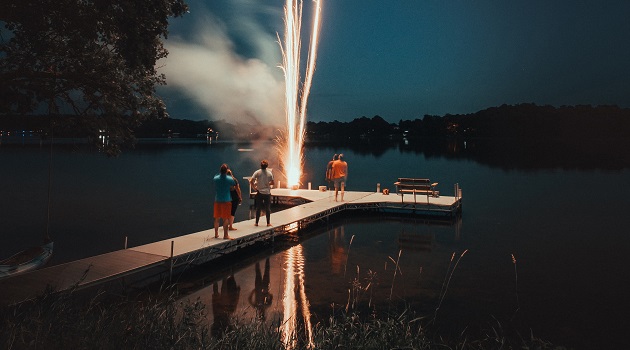Independence Day is just around the corner, and many people plan to gather for cookouts or shoot off fireworks. Prisma Health wants to make sure you spend this holiday making memories with your loved ones – not treating injuries caused by a fireworks misfire or a burn from a grill.
According to the National Fire Protection Association, thousands of people, mainly children and teenagers, are injured while using consumer fireworks each July 4th. A report from the U.S. Consumer Product Safety Commission shows 11,500 people injured and at least nine people dead due to firework-related accidents last year. Sparklers, a family favorite, are one of the more injury-prone fireworks, accounting for more than 25 percent of emergency room firework injuries.
“Be diligent and know the precautions you can take to make sure that you and your loved ones don’t suffer a preventable injury,” said Ann Dietrich, MD, division chief of pediatric emergency medicine for Prisma Health in the Upstate. “Not many people really understand the danger involved with fireworks.”
The safest way to enjoy fireworks this Independence Day is to attend a public event where they are handled by professionals.
If you plan to use consumer fireworks at home, Dietrich recommended these tips:
• Never give small children fireworks or leave them unsupervised near them.
• Do not try to relight a “dud,” only light one firework at a time.
• Don’t use fireworks while under the influence of alcohol or drugs.
• Never hold a firework in your hand.
• Never point a firework at people, animals or vehicles.
• Keep a bucket of water nearby to fully extinguish fireworks.
Sparklers are a fan favorite among children, but they also come with danger if not handled properly. According to the American Academy of Pediatrics, nearly half of fireworks injuries to children under age five are related to sparklers. Sparklers reach up to 2,000 degrees when lit, which is hot enough to melt some metals. This makes them extremely dangerous with the ability to cause third degree burns and lasting eye injuries.
Fireworks also can cause hearing damage, with one loud burst enough to cause some permanent hearing loss if you’re too close, said Dietrich.
Grills can also raise safety concerns. Grilling fires spark more than 10,000 fires on average each year in the United States, and July is the peak month. Many factors can play into these accidents, including failing to properly clean your grill, leaving equipment unattended and placing a grill too close to flammable materials.
“Although grills can be safe when used correctly, an average of 19,000 people visit the ER because of injuries associated with them,” said Scott Bloch, MD, medical director of Prisma Health Children’s Hospital Pediatric Emergency Department in the Midlands.
Bloch offered these additional safety tips while grilling out:
• Grills should only be used outside – and be placed well away from your home, deck railings and out from under leaves and branches.
• Use long-handled tools especially made for cooking on grills.
• Remove grease or fat build-up from your grill.
• Children and pets should be kept at least three feet away.
• If using a charcoal grill, only use charcoal starter fluid as a starter fluid – never gas. Let coals completely cool before disposing in a metal container.
More than half of injuries involving grills are thermal burns (non-fire burns) that are typically caused by contact with a grill or its utensils. Children under the age of five accounted for two-fifths of grill burns, and one out of every ten grill injuries was a contact burn incurred by a young child.
“Have fun this July 4, but take the appropriate safety precautions,” advised Bloch.



